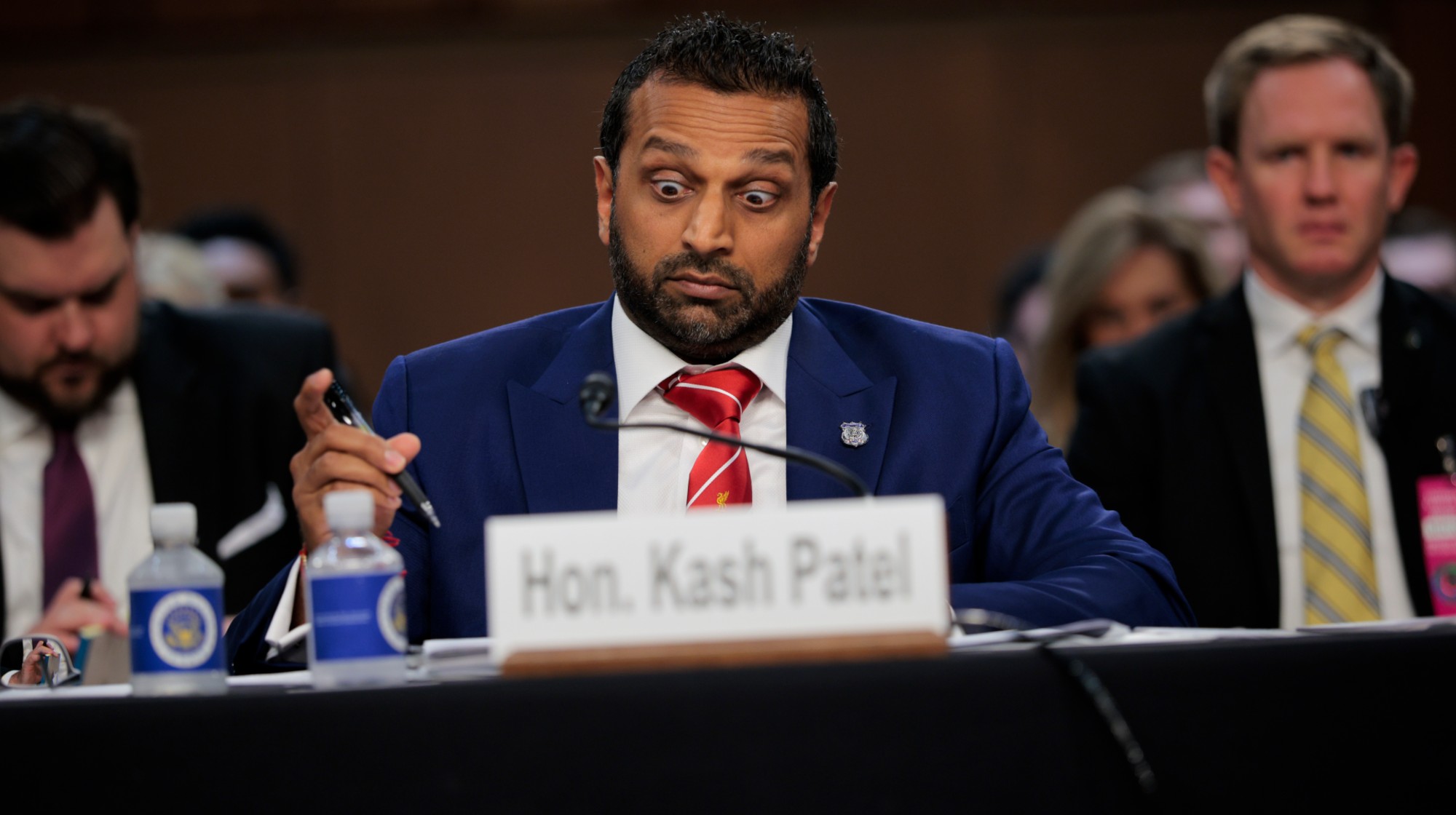Section 702: The fight over the government's spy powers
Critics say the law has been abused. Officials say it thwarts terror attacks. The clock is ticking.


A free daily email with the biggest news stories of the day – and the best features from TheWeek.com
You are now subscribed
Your newsletter sign-up was successful
The quietest big debate in Washington D.C. right now is probably about Section 702 of the Foreign Intelligence Surveillance Act. This is a provision in federal law that empowers authorities to surveil the communications of foreign residents abroad — and also lets the government capture the messages of American citizens "when they're in contact with those targeted foreigners," The Associated Press reported. The provision has few limitations, and no warrants are required for it to be used. Federal officials say the law has helped them thwart terror attacks, while civil libertarians say it doesn't do enough to safeguard Americans' privacy.
The law in its current form expires at the end of the year, and a debate has emerged around its next potential version.
Some reformers want any reauthorization to include a requirement for a court warrant when Americans are caught up in investigations conducted under the law. Section 702 "has been routinely abused in ways that violate Americans' fundamental civil liberties," a group of civil rights organizations said in a letter to Senate Majority Leader Chuck Schumer. The FBI has used Section 702 to access messages of "tens of thousands of protesters, racial justice activists, 19,000 donors to a congressional campaign, journalists, and members of the U.S. Congress," the letter added.
The Week
Escape your echo chamber. Get the facts behind the news, plus analysis from multiple perspectives.

Sign up for The Week's Free Newsletters
From our morning news briefing to a weekly Good News Newsletter, get the best of The Week delivered directly to your inbox.
From our morning news briefing to a weekly Good News Newsletter, get the best of The Week delivered directly to your inbox.
But the government says Section 702 "enables the U.S. government to gain intelligence about our most pressing threats," Assistant Attorney General Matthew G. Olsen, who runs the Justice Department's National Security Division, said in an October speech. The agency has "implemented significant improvements" to protect the rights of Americans, Olsen said. But adding a court-review requirement would slow FBI investigations and "actually make the country less safe," he added.
Scrambled lines
The debate over Section 702 "scrambles the usual partisan lines," The New York Times reported, with "national security hawks and civil liberties-minded lawmakers" on both sides of the issue. Critics say the law's provision that allows American communications to be swept into surveillance of foreign targets amounts to a "backdoor search loophole" to Fourth Amendment privacy protections. But bills in both the Senate and House "stop short of requiring permission from a court" to be used in Section 702 investigations.
President Joe Biden himself has a mixed history on the issue. The ACLU noted that Biden voted as a senator against creating the law in 2008, saying at the time that Section 702 would be a "breathtaking and unconstitutional expansion" of executive branch investigative powers. But fifteen years later, the Biden administration is now advocating for the law's renewal. The ACLU wants tougher guardrails, saying, "whether a tool is convenient for the government does not answer the question as to whether that tool is constitutional."
Even advocates suggest some reforms are needed. Section 702 should be renewed, The Washington Post opined, but it should also be improved. FBI officials should be able to chase down leads when Chinese officers reach out to Americans "in hopes of turning them into spies for Beijing," the Post said. The outlet argued for codified some of the agency's newer procedures — which require high-level officials to approve searches involving "elected officials, members of the media, academics and religious figures." These procedures have helped make government overreach less likely, the Post said.
A free daily email with the biggest news stories of the day – and the best features from TheWeek.com
'Operationally unworkable'
The Biden administration has quietly been pushing to renew Section 702 for most of 2023, but Axios reported that the first bill to do so was only introduced by lawmakers this month. The proposal would require investigators "to get prior approval from the attorney general before conducting a search for communications about or from a U.S. citizen." They could also only do so in cases involving "terrorism, drug trafficking, attacks on critical infrastructure or government officials and cyberattacks." The Biden administration has called the bill in its current form "operationally unworkable."
FBI Director Christopher Wray made an impassioned plea for Section 702 during an appearance before Congress this week, saying that American security will be threatened if the law lapses. Wray added that it would be "absolutely devastating" if a rival country launched an attack — or a cyberattack — that the U.S. didn't see coming. "Imagine," Wray said, "if we're not able to disrupt the threat because the FBI's 702 authorities have been so watered down."
Joel Mathis is a writer with 30 years of newspaper and online journalism experience. His work also regularly appears in National Geographic and The Kansas City Star. His awards include best online commentary at the Online News Association and (twice) at the City and Regional Magazine Association.
-
 Tourangelle-style pork with prunes recipe
Tourangelle-style pork with prunes recipeThe Week Recommends This traditional, rustic dish is a French classic
-
 The Epstein files: glimpses of a deeply disturbing world
The Epstein files: glimpses of a deeply disturbing worldIn the Spotlight Trove of released documents paint a picture of depravity and privilege in which men hold the cards, and women are powerless or peripheral
-
 Jeff Bezos: cutting the legs off The Washington Post
Jeff Bezos: cutting the legs off The Washington PostIn the Spotlight A stalwart of American journalism is a shadow of itself after swingeing cuts by its billionaire owner
-
 Fulton County: A dress rehearsal for election theft?
Fulton County: A dress rehearsal for election theft?Feature Director of National Intelligence Tulsi Gabbard is Trump's de facto ‘voter fraud’ czar
-
 The ‘mad king’: has Trump finally lost it?
The ‘mad king’: has Trump finally lost it?Talking Point Rambling speeches, wind turbine obsession, and an ‘unhinged’ letter to Norway’s prime minister have caused concern whether the rest of his term is ‘sustainable’
-
 Why are federal and local authorities feuding over investigating ICE?
Why are federal and local authorities feuding over investigating ICE?TODAY’S BIG QUESTION Minneapolis has become ground zero for a growing battle over jurisdictional authority
-
 Constitutional rights are at the center of FBI agents’ lawsuit
Constitutional rights are at the center of FBI agents’ lawsuitIn the Spotlight The agents were photographed kneeling during a racial justice protest
-
 Ex-FBI agents sue Patel over protest firing
Ex-FBI agents sue Patel over protest firingspeed read The former FBI agents were fired for kneeling during a 2020 racial justice protest for ‘apolitical tactical reasons’
-
 Memo signals Trump review of 233k refugees
Memo signals Trump review of 233k refugeesSpeed Read The memo also ordered all green card applications for the refugees to be halted
-
 Western Alaska reels as storm aftermath prompts mass evacuations
Western Alaska reels as storm aftermath prompts mass evacuationsUNDER THE RADAR Alaskan lawmakers point to climate change as airlifts relocate hundreds from coastal communities devastated by the remnants of Typhoon Halong
-
 Democrats: Harris and Biden’s blame game
Democrats: Harris and Biden’s blame gameFeature Kamala Harris’ new memoir reveals frustrations over Biden’s reelection bid and her time as vice president
